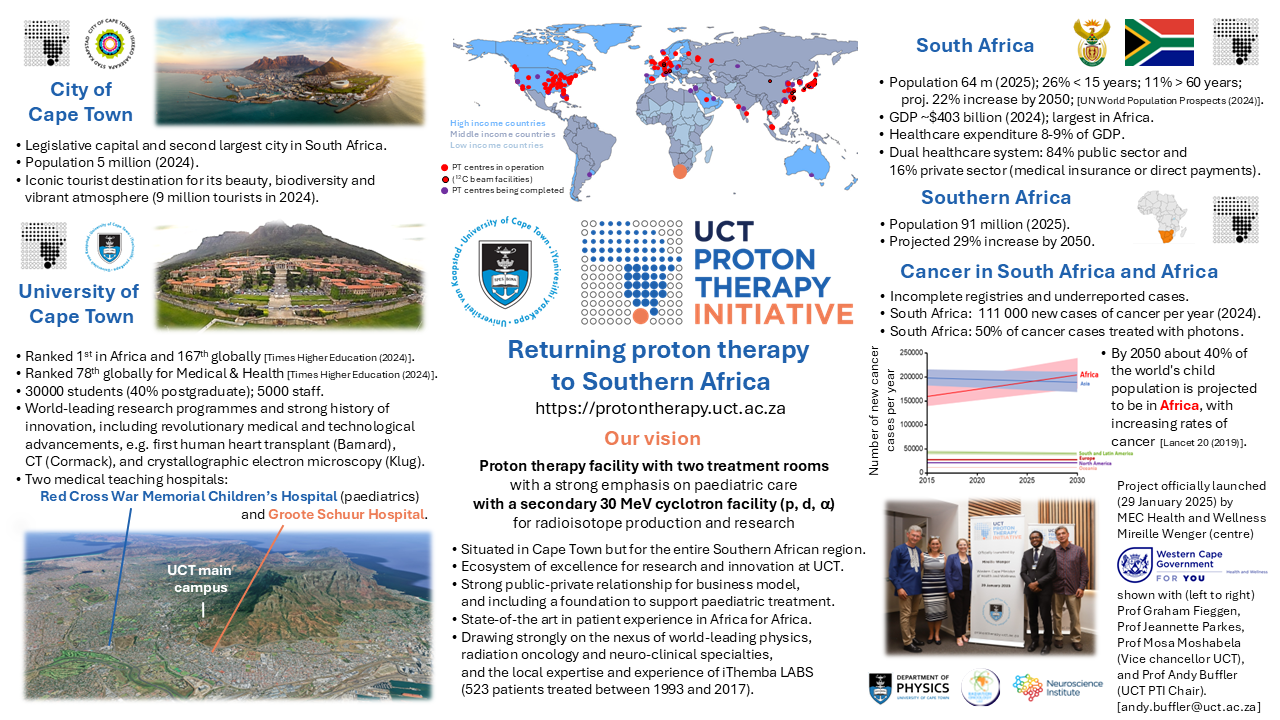
The challenge
Cancer is a global health challenge, and while advancements in treatment have been significant, there remains a glaring disparity in access to cutting-edge therapies, particularly in low- and middle-income countries, where over half of global cases and two thirds of cancer-related deaths occur. In Africa, cancer is characterised by high mortality and the disproportion between mortality rates in Africa and those in high-income countries is most striking for childhood cancers (80% versus 20% in the USA and Canada). Since Africa is poised to become the continent with the highest number of children and is projected to carry the greatest global burden of paediatric cancer within the next 5 years, this emerging health crisis requires immediate attention and a multifaceted approach.
Our solution
A multidisciplinary team at the University of Cape Town has launched an initiative to design the technical specifications and business case for a proton therapy centre to be established in Cape Town, which will be situated close to our major academic medical centres, the Red Cross War Memorial Children’s Hospital and Groote Schuur Hospital. Proton therapy, a precise form of radiation treatment, utilises a beam of energetic protons from a cyclotron. Unique characteristics of this proton beam allow a type of radiotherapy treatment which is highly effective for a wide range of tumours. In children in particular, proton beam therapy is now recognised as superior to conventional radiotherapy techniques since there is less damage to normal tissue and a reduced risk of secondary malignancy and late effects.
Global distribution of operational proton therapy centres
Of the 136 proton therapy centres operating globally, all are located in the northern hemisphere, with only two under construction in the southern hemisphere – in Argentina and Australia. Although a centre is in the planning stages in Egypt, proton therapy is currently unavailable in Sub-Saharan Africa, leaving a critical gap in the spectrum of cancer care. A cyclotron-based proton therapy centre in Cape Town would allow regional access to cutting-edge treatment for children with cancer and other benign tumours, access to treatment for many adolescent and adult cancers, and additional unique research in the context of Africa. This will contribute significantly to reducing the existing healthcare disparities in the region.

Data sources: Particle Therapy Co-Operative Group 2024; World Bank:2023
The proposed centre
The proton therapy centre will be designed to benefit from the very latest technological advances in terms of the leading radiation delivery systems for both children and adults. It will also include facilities for the production of short-lived radioisotopes for nuclear medicine, and beam lines for research in physics, engineering, neuroscience, radiation metrology and radiobiology. The centre will bring significant positive attention to the healthcare sector in Cape Town, and as a unique, world-class resource provide a health ecosystem not only for Cape Town and the rest of South Africa, but for the African continent more broadly.
The local expertise
The multidisciplinary project features both an outstanding paediatric and adult oncology clinical team based at UCT and associated hospitals, spanning both public and private sectors, and strong expertise in accelerator-based research and development, with teams already involved in outreach projects within Sub-Saharan Africa. Together with a strong record of clinical and scientific research, this nexus of specialised expertise lays a strong foundation to tackle a project of this magnitude. The UCT Proton Therapy Initiative is the first of its kind in Sub-Saharan Africa, and as the leading university on the continent, the University of Cape Town is well placed to advance proton therapy and research for maximum impact on our continent.

